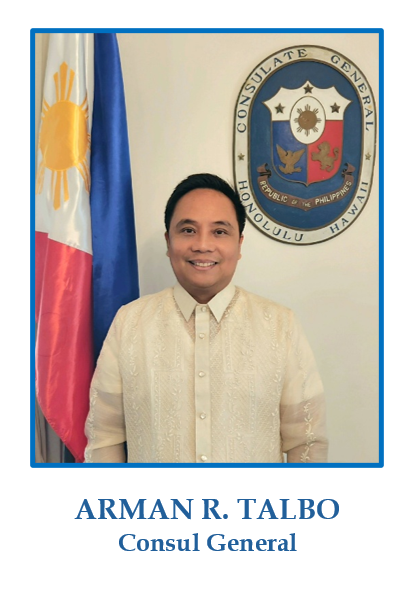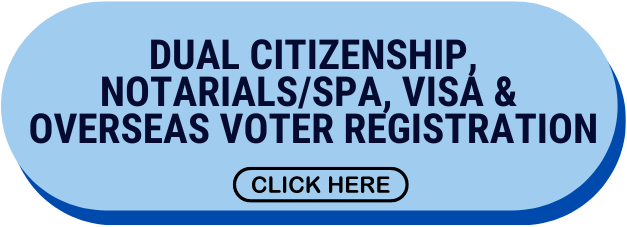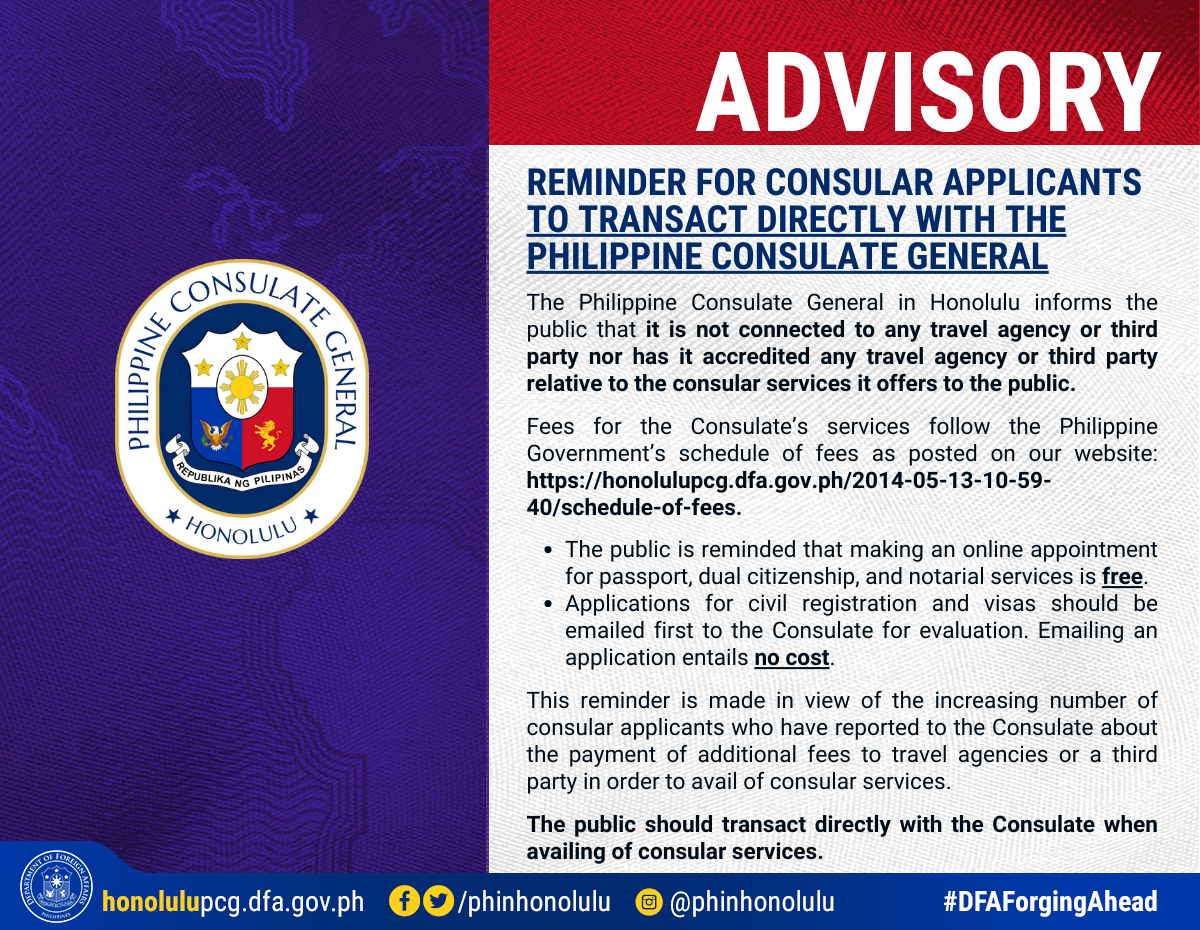
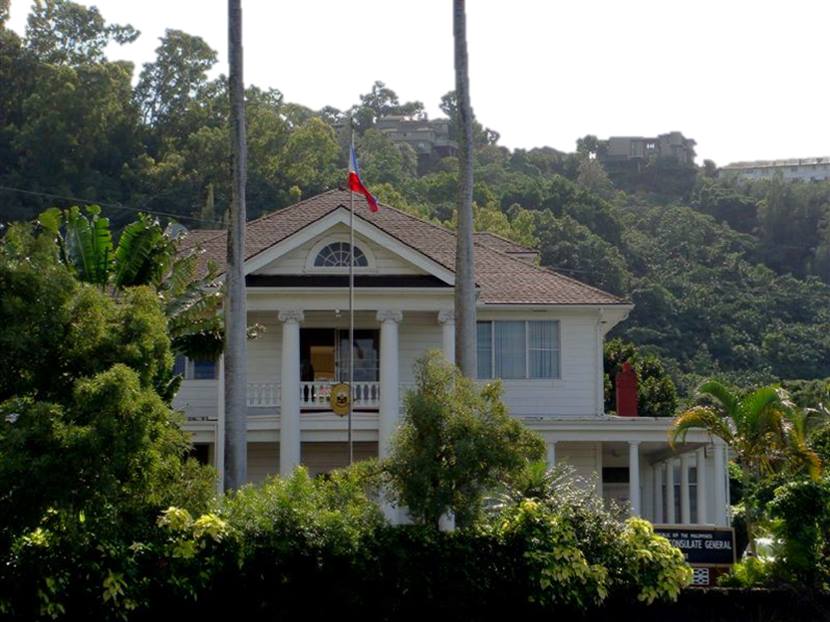 Welcome to the official website of the Philippine Consulate General in Honolulu, Hawaii, where you can find general information on the Consulate and its services, programs and activities, news on and from the Philippines and important announcements for our kababayans in Hawaii and American Samoa.
Welcome to the official website of the Philippine Consulate General in Honolulu, Hawaii, where you can find general information on the Consulate and its services, programs and activities, news on and from the Philippines and important announcements for our kababayans in Hawaii and American Samoa.
Maraming salamat po at Mabuhay!
Online Appointment
The Philippine Consulate General in Honolulu, in line with the thrust of the Department of Foreign Affairs to provide efficient and comfortable service to all Filipinos, has implemented a consular service appointment system beginning May 01, 2018. All consular services will be by appointment only. SECURING AN APPOINTMENT IS ABSOLUTELY FREE OF CHARGE.
Unless you have an appointment, we will not be able to accommodate you. Please make sure you have a valid U.S. cellphone number and email address (Yahoo and Gmail only) where automated confirmatory messages will be sent to you. The confirmatory email will include your appointment schedule and the requirements for a particular type of consular service you wish to avail of.
If you cannot make it to your scheduled appointment, you are kindly requested to cancel your appointment to give way to other applicants. DOUBLE REGISTRATION WILL MAKE YOUR APPOINTMENT NULL AND VOID.
For appointments, please click the appropriate link below.
The Consulate endeavors to attend to applicants as close as possible to their appointment time. However, service times could vary due to special cases of individual applicants.

Starting 21 March 2022, the Philippine Consulate General in Honolulu will resume acceptance of passport applicants through its Courtesy Lane. The following are eligible for passport service through the Courtesy Lane:
1. Applicants who are 60 years old and above
2. Minors who are 7 years old and below (with parent/s or authorized adult companion)
3. Applicants with disability (must present a Disability ID)
4. Pregnant applicants (must present medical record)
5. Applicants with immediate need for a passport (must present proof of urgency such as death certificate or medical certificate)
The Consulate is able to accept a maximum of 15 Courtesy Lane applicants per day.
While applicants availing of the Courtesy Lane may apply for passport service during the Consulate’s business hours (9am to 3pm from Monday to Friday, except holidays), priority shall be given to applicants with appointments.
Advisories
Accreditation of foreign media visiting the Philippines
The following are the documentary requirements and forms provided by the
Presidential Communication Office International Press Center (IPC) related to
accreditation of all foreign media visiting the Philippines:
1. IPC Accreditation Form
2. List of Requirements for Visiting Media
3. Health Declaration Form
4. Consolidated Crew List
NBI Clearance
Guidelines in Applying for National Bureau of Investigation (NBI) Clearance for Applicants Abroad
Applicants who are living/working abroad must secure and accomplish the NBI Fingerprint Card Form, available at the Philippine Embassy/Consulate General, and send it to the NBI in the Philippines for the issuance of an NBI Clearance Certificate. This process also applies to Foreign Nationals who had lived in the Philippines and are required to submit a NBI Clearance Certificate.
Application for NBI is made in person and by appointment only. The Consulate does not accept mailed-in applications.
Requirements for First Time Applicants:
1. Principal/s (person/s executing the document) must appear personally at the Consulate to sign the document/s before a Consular Officer/Staff for Notarial Services.
2. Applicant will be provided a Fingerprint Card Form. Please fill out the personal data truthfully and legibly.
3. Provide the following:
- Two (2) identical photographs (2″ x 2″) taken in plain white background within the last three (3) months. Blurred or low-quality photos are not accepted.
- Original and photocopy of valid identification with photograph and signature of the holder (e.g. passport, driver’s license or any other government-issued identification card).
- A non-refundable fee of USD 25.00 to be paid in cash, US postal money order, debit/credit card (3% convenience fee applies), manager’s check, or cashier’s check.
- Self-addressed USPS priority mail envelope, with postage fee of US$10.10 for the mailing of the processed NBI Fingerprint Card Form.
4. For the fingerprinting procedure, the Consular Officer/Staff will assist in capturing your fingerprints impression (rolled impression) on the appropriate spaces in the form.
5. New applicants are required to register online at www.nbi.gov.ph. The applicant is required to sign-up and sign-in to apply for clearance until a reference number appears on the computer screen. Please copy this reference number as this will serve as the NBI’s code in the retrieval of the applicant’s data and status of application.
Requirements for Renewal of NBI Clearance:
For applicants previously issued NBI Clearance Certificate from 2011 and beyond:
Have your certificate authenticated first by the Information and Communication Technology Division (ICTD) ( https://nbi.gov.ph/citizens-charter/nbi-clearance-ictd/ ).
1. Together with the NBI Clearance Certificate, provide the following:
- Two (2) identical photographs (2″ x 2″), taken in plain white background and taken within the last three (3) months. Blurred or low-quality photos are not accepted.
- Original and photocopy of valid identification with photograph and signature of the holder (e.g. passport, driver’s license or any other government-issued identification card).
2. Renewal applicants are required to register online at www.nbi.gov.ph. The applicant is required to sign-up, sign-in, and fill-out all the personal information to generate a reference number. Please copy the reference number as it will serve as the NBI’s code in the retrieval of the applicant’s data and verification of status of application.
For applicants with previously issued NBI clearances from 2014 to present:
Applicants can renew their NBI clearance without the need to accomplish a new NBI Fingerprint Card Form provided that no changes were made on their personal data (ex. Name, Date of Birth, Place of Birth). Moreover, applicants no longer need to register online. Applicant must provide 2″x2″ photos and copy of valid identification card with photograph and signature of the holder together with the clearance certificate dated 2014 to present and submit them to the NBI.
For the issuance of NBI Clearance in the Philippines:
Applicants can submit their accomplished form and payment to the NBI either:
By Mail:
1. Enclose a money order or bank draft in the amount of Two Hundred Pesos (P200.00), in Philippine currency, negotiable in the Philippines, and made payable to the “NBI Director, Taft Avenue, Ermita 1000 Manila, Philippines”. Cash is also accepted.
2. Send the accomplished form and other requirements to:
Mailed Clearance Section
3/F NBI Clearance Building
National Bureau of Investigation
Taft Avenue, Ermita, Manila 1000 Philippines
For inquiries, the NBI may be reached at telephone number +632 523-8231 loc. 5465. The processing time will take a maximum of five (5) days upon receipt of documents.
Through a Representative:
1. If the form will be submitted by the applicant’s representative, send the accomplished form and payment to your representative, along with a Notarized Letter of Authorization authorizing him/her to transact on your behalf.
2. The applicant’s representative proceeds to the NBI Office to submit the form and pay the appropriate fee at the following address:
Electronic Data Processing Division (EDPD)
National Bureau of Investigation
Taft Avenue, Ermita Manila 1000 Philippines
Note:
Upon receipt of your NBI clearance certificate, please examine it for the presence of the embossed NBI DRY SEAL. The clearance is invalid without it. Applicant must affix his/her clear and properly taken THUMBPRINT on the space provided for on the clearance certificate with the assistance of any local police in his/her area before submitting it to the end-user/ requesting party.
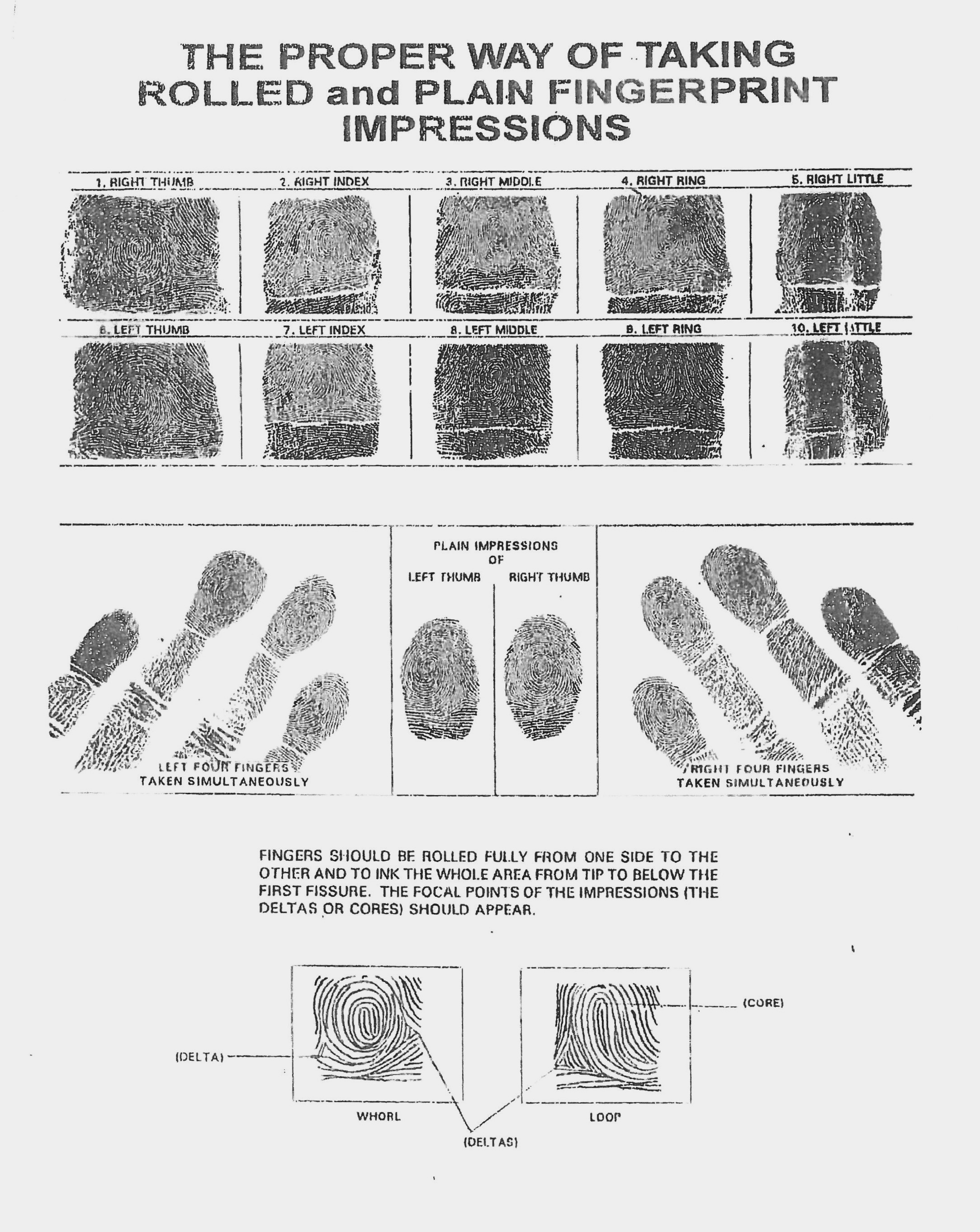
Judicial Recognition of Foreign Divorce in the Philippines
There is no divorce in the Philippines, but when a divorce is validly obtained abroad and initiated by the foreign spouse, the Filipino spouse shall have the capacity to remarry under Philippine law.
The foreign divorce decree must be judicially enforced or confirmed in the Philippines by filing the proper civil action at the Regional Trial Court in the Philippines (RTC-Phil). The court decision shall be registered in the Local Civil registry Office (LCRO) where the concerned RTC-Phil functions.
The registered document shall be submitted to the Local Civil Registrar where the marriage is registered. If the marriage was registered overseas, the registered document shall be submitted to the City Civil Registry Office at the Manila City Hall (CCRO Manila).
The following documents shall be submitted to CCRO Manila in annotating a civil registry document:
- Original or Certified True Copy of the foreign judgment or order duly registered at the City Civil Registry Office at the Manila City Hall (CCRO Manila).
- Original or Certified True Copy of the Certificate of Finality of the decision of the Regional Trial Court (RTC-Phil).
- Certificate of Registration of the decision of the Regional Trial Court (RTC-Phil) at the Local Civil Registry Office (LCRO) where the concerned RTC-Phil functions.
After the annotation at the Local Civil Registrar’s Office (LCRO), the annotated documents and its requirements must be submitted to the Office of the Civil Registrar-General (OCRG) in Manila.
For additional information on legal services, legal aid or hiring the services of a lawyer in the Philippines, kindly check the websites of the Integrated Bar of the Philippines (IBP) or the Public Attorney’s Office (PAO) in Manila.
Recognition is a judicial process where both the foreign divorce and the foreign divorce law need to be proven in Court. You will need to file a Petition for Recognition of Foreign Divorce with the Regional Trial Court in the Philippines. You will need to hire a lawyer to prepare and conduct the case.How can the foreign divorce be recognized in the Philippines?
What are the documents you should prepare?
- Philippine marriage certificate/ record, if the marriage was celebrated in the country
- Official Marriage certificate/record from the foreign country, if the marriage was celebrated abroad
- Report of Marriage of a Filipino married abroad (if one was filed with the DFA)
- Official copies of foreign divorce documents
- Certified copy of the foreign country’s divorce law
- Documents showing proof of Citizenship, i.e., Naturalization Certificate
Note that this is a general list. Depending on the particular foreign country involved, and depending on the particular case, other documents may be necessary. This is because countries differ in marriage and divorce processes and documents.
Foreign-issued documents need to be certified by the issuing foreign office and authenticated by the Philippine Embassy or Consulate whose jurisdiction covers the foreign country, or Apostilled by the competent foreign authority in the said country.
Please note the following:
The Divorce Decree/ Order must be issued by a Court and certified by the Clerk of Court
The Divorce Law must be issued by a State and certified by a law librarian in that State where divorce was issued as the copy of the divorce law of that State.
Judicial Recognition of Foreign Divorce in the Philippines
JUDICIAL RECOGNITION OF FOREIGN DIVORCE IN THE PHILIPPINES
There is no divorce in the Philippines, but when a divorce is validly obtained abroad and initiated by the foreign spouse, the Filipino spouse shall have the capacity to remarry under Philippine law.
The foreign divorce decree must be judicially enforced or confirmed in the Philippines by filing the proper civil action at the Regional Trial Court in the Philippines (RTC-Phil). The court decision shall be registered in the Local Civil registry Office (LCRO) where the concerned RTC-Phil functions.
The registered document shall be submitted to the Local Civil Registrar where the marriage is registered. If the marriage was registered overseas, the registered document shall be submitted to the City Civil Registry Office at the Manila City Hall (CCRO Manila).
The following documents shall be submitted to CCRO Manila in annotating a civil registry document:
- Original or Certified True Copy of the foreign judgment or order duly registered at the City Civil Registry Office at the Manila City Hall (CCRO Manila).
- Original or Certified True Copy of the Certificate of Finality of the decision of the Regional Trial Court (RTC-Phil).
- Certificate of Registration of the decision of the Regional Trial Court (RTC-Phil) at the Local Civil Registry Office (LCRO) where the concerned RTC-Phil functions.
After the annotation at the Local Civil Registrar’s Office (LCRO), the annotated documents and its requirements must be submitted to the Office of the Civil Registrar-General (OCRG) in Manila.
For additional information on legal services, legal aid or hiring the services of a lawyer in the Philippines, kindly check the websites of the Integrated Bar of the Philippines (IBP) or the Public Attorney’s Office (PAO) in Manila.
How can the foreign divorce be recognized in the Philippines?
Recognition is a judicial process where both the foreign divorce and the foreign divorce law need to be proven in Court. You will need to file a Petition for Recognition of Foreign Divorce with the Regional Trial Court in the Philippines. You will need to hire a lawyer to prepare and conduct the case.
What are the documents you should prepare?
- Philippine marriage certificate/ record, if the marriage was celebrated in the country
- Official Marriage certificate/record from the foreign country, if the marriage was celebrated abroad
- Report of Marriage of a Filipino married abroad (if one was filed with the DFA)
- Official copies of foreign divorce documents
- Certified copy of the foreign country’s divorce law
- Documents showing proof of Citizenship, i.e., Naturalization Certificate
Note that this is a general list. Depending on the particular foreign country involved, and depending on the particular case, other documents may be necessary. This is because countries differ in marriage and divorce processes and documents.
Foreign-issued documents need to be certified by the issuing foreign office and authenticated by the Philippine Embassy or Consulate whose jurisdiction covers the foreign country, or Apostilled by the competent foreign authority in the said country.
Please note the following:
The Divorce Decree/ Order must be issued by a Court and certified by the Clerk of Court
The Divorce Law must be issued by a State and certified by a law librarian in that State where divorce was issued as the copy of the divorce law of that State.



